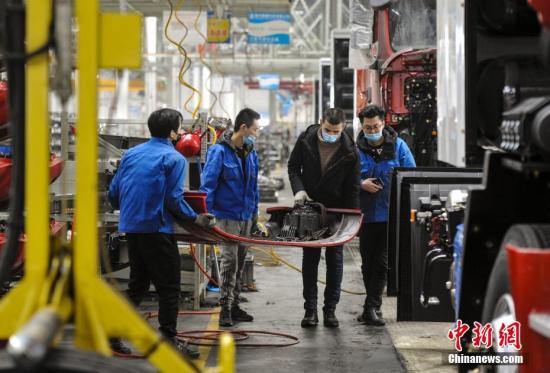(Countering new crown pneumonia) China's economic war "epidemic" record: three major financial forces gather to rescue small and medium businesses
China News Agency, Beijing, March 6 (Reporter Wei Wei) Government and enterprises set up a platform, financial bridges, and technology participation ... Chinese forces are working together to rescue a large number of small and medium businesses and alleviate the new crown pneumonia epidemic. The impact of the operator.
On March 3, the assembly workshop of Shaanxi Xinjiang Automobile Co., Ltd., located in the Economic and Technological Development Zone (Toutunhe District) of Urumqi, Xinjiang, is stepping up production. China News Agency reporter Liu Xinshe
Small and medium businesses are not only employment stabilizers in China, but also capillaries operating in a market economy. They are scattered between urban and rural corners and between streets. In addition to the large number of small, medium and micro enterprises, there are more than 83.31 million registered individual industrial and commercial households in China. They alone have driven more than 200 million employees. Small and medium businesses are an important force that cannot be ignored in China's economy, and they are also the most difficult group to obtain financial support.
At present, in order to better support the orderly restoration of small and medium businesses and support economic recovery, the three major financial forces are converging.
The first is to protect the “cash flow” of merchants. As the platform with the largest number of small and medium-sized business partners in China, Alibaba launched the “0 Account Period” function in February. "You send out the goods, you can immediately raise the funds, and saved my life." Zhang Tianyi, founder of the flagship store of Baman Foods, said in an interview with reporters that he has closed dozens of offline stores. Next, all changed to online sales, daily online store sales rose from more than 100,000 yuan to 600,000 yuan. "In more than 10 days in the middle and late February, we sold more than 10 million yuan of Hunan rice noodles, got cash, paid the salaries of more than 500 offline employees, paid for the goods, and paid the rent of offline stores. . "
As one of the first five private banks approved by the China Banking Regulatory Commission, "Alibaba-based" online merchant banks have prepared 50 billion yuan to 100 billion yuan of funds to help online store merchants from the past "buyer confirmed receipt of goods to receive Money ", and now" send a single parcel, and immediately receive a money. " Feng Liang, deputy governor of Netcom Bank, told reporters, "We have calculated the average seller's average account period has been shortened by 7.5 days, and for many small merchants, one day's funding in advance can save lives."
The second is loan support. Recently, 100 banks in China gathered quickly and formally launched a "contactless loan" program to help small and micro enterprises. Through this "contactless loan" program, about 10 million small and micro enterprises and self-employed households in China can obtain loans with "3 minute application, 1 second loan, credit check and 0 manual intervention".
Chinese banks are also struggling to "get financial support ahead of the trapped companies." Fujian Zhongyi Solar Technology Co., Ltd. is a small and medium-sized company. Since the end of last year, the company has received many overseas orders, but due to the epidemic, the original production plan was forced to be postponed. The person in charge of the company told reporters that in the "extraordinary period", the company obtained the rapid refinancing provided by the Industrial Bank Quanzhou Branch, and also received an additional 7 million yuan in loans, which solved the urgent need. The reporter learned that during the epidemic, Industrial Bank alone issued more than 6 billion yuan in loans to 314 SMEs related to the epidemic prevention and control.
The third is small and micro enterprise bonds. This week, Zheshang Bank issued special financial bonds for small and micro enterprises amounting to RMB 10 billion with a coupon rate of only 2.95%. This is the lowest interest rate among the financial bonds issued by Zheshang Bank in recent years. The bonds raised this time will all be used for small and micro enterprise loans, and part of the funds will be used for small and micro enterprise loans for the prevention and control of new coronavirus pneumonia.
Bank of Ningbo has also recently been approved to publicly issue financial bonds of no more than 20 billion yuan in the national interbank bond market, specifically for the granting of loans to small and micro enterprises.
The central bank's office meeting held in late February this year proposed that financial institutions should provide industries, private enterprises, and small and micro enterprises that have been affected by the epidemic to the problems of debt repayment, capital turnover, and expansion of financing. Special credit lines and make full use of the existing inclusive monetary policy tools. (Finish)

